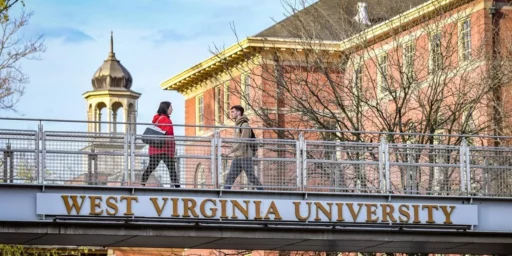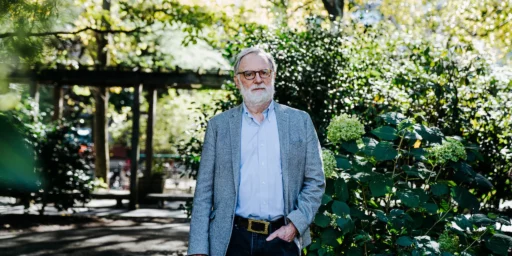Universities vs. Education
The skyrocketing cost of tuition makes it harder for students to justify getting a liberal arts education rather than training for a high paying job.
Dan Edelstein, who teaches French at Stanford, has a provocative piece in Inside Higher Ed (“The University vs. Liberal Education“) arguing that the academy is driving students away from the humanities.
It has by now become received wisdom: college students today are less interested in traditional subjects, and have become more professionally oriented. They’ve voted with their feet, choosing business, pre-med, and engineering majors over German, art history, or comparative literature. Clearly, it’s in the zeitgeist. Unfortunately for humanities professors, however, lower enrollment can translate into the elimination of entire departments: just ask German professors at the University of Southern California. But what’s to be done? The client is king, and students are our clients in higher education. The only problem with this logic is that universities in fact bear a considerable responsibility for the brain drain away from the humanities. By raising the cost of education to stratospheric levels, we oblige students to seek a higher return on their investment. It is this sort of economic calculation, I suggest, and not some alleged generational change, that is driving students in droves towards preprofessional degrees.
[…]
The irony, of course, is that a B.A. in French or classics provides students with many of the qualities that employers most commonly request, such as critical thinking, cultural proficiency, and good writing and communication skills. A solid liberal education is just as beneficial for the vast majority of professions; in addition, it prepares for a life well-lived, and not just for a career. But if universities continue to charge as much as they do, they will progressively steer students away from the very subjects that, until recently, constituted the very core of the university.
This continues a pet peeve of mine: the insistence on turning higher education into vocational training. But, when you sell it as a way to get ahead in the job market — and keep raising the prices you charge to do it –you have to deliver results. It’s hard to justify starting off $200,000 in debt if you’re going to be lucky to get hired at $30,000 a year when you graduate.
Edelstein has his own explanation for the rising costs:
While the skyrocketing cost of college education is no doubt inexplicable from the outside (why should tuitions increase at a pace far faster than inflation?), the answer, from the inside, appears fairly humdrum. Put simply, universities are engaged in an arms race: they compete to bring the best-armed students to their campuses. This means incessantly inventing new programs. Stanford offers freshman seminars? Harvard will too! Yale has highly rated residential education? Penn must improve! Top schools similarly compete for faculty academostars, luring them not only with high salaries and other perks, but also a reduced teaching load. The price for such celebrity academics, of course, gets passed on to the student. This arms race at the top – and liberal arts colleges seem to suffer from the same educational-industrial complex – thus drives the cost of attending the Ivies way up. And when students have to pay 40 grand to attend Cornell, other colleges and universities must raise their tuitions as well, to stay in competition.
I’m rather dubious of this. It may explain why it’s so expensive to attend a handful of elite institutions but there’s not much reason for it to trickle down to the third tier schools. And, frankly, the Ivies and Stanfords have enormous endowments that can defray the costs of chasing superstars.
To the extent that competition for star professors is the problem, it’s not so much that schools are bidding up the salaries but that they’re bidding down the teaching load. A star professor who deigns to teach or or two classes a year — preferably tiny sections — is more of a hood ornament than an engine.
But even that’s a small part of the problem. Bloated bureaucracies are a much larger part. And, for state schools at least, an even larger part is that taxpayer subsidies are going down, forcing students and their families to pay more of the cost.







Well, in Latin America, Europe and North America there is too much people attending humanities courses, and most of them have poor quality. That´s does not work.
Basically I agree with you about the bureacracy problem at schools Jim. It’s totally out of control (and I’ve sat on a university advisory board). I’m not sure a liberal arts degree at undergrad level is that much of disadvantage except up against the more obviously esteemed vocational degrees like accountancy. Most undergrad vocationals need a masters to consolidate them.
Well, some people seem to talk about the virtues of a liberal arts education in the job market, and then talk about how colleges should not do vocational training.
With Logic 210 under their belts, they might see the contradiction.
Really, if you don’t want vocational training, then you are talking avocational training … and how much do you want to pay for that?
(If I’m going to take a loan, it better have an ROI, and therefore be vocational.)
I think a major factor here is the fact that state governments (and some large city governments) no longer provide free, or very inexpensive quality undergraduate educations at state-run schools. There has been a generations-long movement away from the practice of government support for higher ed through these schools. The result is that tuition at these schools has gone up at much higher rates than inflation or even the improvements to the school would warrant.
Without the very inexpensive state schools holding down the market prices overall, the private schools have been free to raise their own tuition as well.
That’s not it, precisely. The argument is that AN EDUCATION is a good thing to have at the sorts of jobs that hire people coming out of college. That writing skills, the ability to reason, and so forth are much more valuable than the highly perishable skills designed to prepare you for a specific job.
Now, that gets undercut when universities don’t insist that each graduate actually possess said skills. But that’s a different argument.
“The argument is that AN EDUCATION is a good thing to have at the sorts of jobs that hire people coming out of college. That writing skills, the ability to reason, and so forth are much more valuable than the highly perishable skills designed to prepare you for a specific job.”
Fundamentally I agree with you Jim although not all vocational skills are highly perishable. I also think there’s a bit of line to be drawn between what are really “technician” degrees and those that are more professionally oriented. Personally I found politics, economics and philosophy not a bad prep for making and selling widgets.
We must think the major positive externalities accrue from K-12 education, because that’s when it stops being universal and free (let alone mandatory).
Maybe you are just missing the days when K-12 did that.
If we go beyond that it might start to get to be a different sort of elitist positive externality … that there are some subset of people suited to a liberal arts education and that we all benefit if they get it.
Pfft. The public library is down the street.
(Maybe that is my post-elitist position, that the subset of people who can benefit, can benefit sufficiently from The Great Books.)
I really, really hope this is not the shape of things to come:
I expect this to be like health care. Everybody knows it’s a problem yet rather than look at ways to control costs they will instead just propose pumping more money into the system to pay for it. More money in the system then leads to the ability to raise prices more. Problem not solved.
When my son applied for financial aid they sent a letter showing costs, resources, and the shortfall with the suggestion of go borrow the money. Some kids have been duped into doing that and are now saddled with that debt for a good part of their adult life. The school on the other hand made out like a bandit with no remorse for that alum’s debt burden. It’s racket and I have lost respect for the college administrators who are a part of this scheme.
“Some kids have been duped into doing that and are now saddled with that debt for a good part of their adult life.”
Most of the duping is being done by for profit colleges who have 40% drop out rates. Degrees from traditional state and private universities are a virtual must for any sort of career. And far from money being thrown at many state and second tier private colleges they are facing funding crises as Sam explains. But don’t let any of this info interfere with certain bizarre prejudices you seem to hold dear. You also don’t apparently know that the president has largely removed college loans from the private sector, increased their availability and reduced their cost. But as I said I don’t want to overburden you with facts.
I was shocked a few years ago to learn that a local JC had aid and loan departments. Talk about a segment that should be cash and carry …
Brummagem, How about not making judgments before you have the facts? I agree the for profit colleges have been the worst offenders and would not offer a defense of them. That does excuse the state colleges and universities from fault however. I am aware of the student loan changes but I doubt it will have a material effect on the problem.
I’m curious what bizarre prejudices you speak of and why you like picking fights when no else is looking for one?
“That does excuse the state colleges and universities from fault however.”
Glad to hear you confirm that
“I am aware of the student loan changes but I doubt it will have a material effect on the problem.”
They are only pumping tens of millions of additional cash into the program for Pell grants and the like and making it available at lower cost than it used to be available from private lenders so how could it possibly have any material effect? What a silly notion.
“and why you like picking fights when no else is looking for one?”
As a rationalist I feel a strong impulse to refute irrationality. No doubt I would have been burned for it in the 16th century.
If we killed the government-student loans, colleges (or somebody) would figure out how to deliver education at Amazon prices.
The technology is wall to wall. It’s a cultural block.
People way who run virtual salons in the blogosphere at the same time believe learning can only occur with a physical clustering of bodies. “With Logic 210 under their belts, they might see the contradiction.”
“People who [s]ay run …”
ohn personna says:
Thursday, October 14, 2010 at 17:33
‘If we killed the government-student loans, colleges (or somebody) would figure out how to deliver education at Amazon prices.”
I doubt it. If we killed Medicaid tomorrow do you think they’d figure out how to provide healthcare for the poor at Amazon priceS?
I am much more confident in self-education than I am in self-medicine.
My opinion is colored by my experience, getting a job outside the field of my degree, by self education. And seeing my nephew self-educate on things that motivate him.
To some degree I had an advantage because I was always a reader, and a bachelors in chemistry was to a good part about teaching you to learn on your own … but they didn’t take that long to teach that part. Like an hour to visit the library, examine the journals, show where the indexes were …
Is self-education, especially with a support network, really that hard?
What I’m saying is, why aren’t we looking at how to establish inexpensive support networks, rather than continuing the 13th century model of university education?
BTW, James made a slur up at the top, “the highly perishable skills”.
Pfft. The framework in technology is commutative. I’ve taught myself 3 or 4 programming paradigms and and maybe 12 computer languages based on the framework I learned in a few programming electives. I didn’t need to go back to university to do it.
john personna says:
Thursday, October 14, 2010 at 19:35
“Is self-education, especially with a support network, really that hard?”
For most people yes. And the examples from your personal experience were basically technical education. Sure you can learn basic economics, history or philosophy by rote but I’m not sure it teaches you to think about it. The other thing about a good university education (accepting that not all university educations are good) is that it’s about a lot more than just learning. At Oxford and Cambridge in Britain they famously say you want to get a first or a third and to some extent this at some universities over here. Universities are not just about graduating cum laude.
There are conservatives who will fight every revolution. While you say it is impossible, someone will be doing it.
It’s sad really, because doing it faster would be good for everyone.
Hacking Education
john personna says:
Friday, October 15, 2010 at 09:04
“There are conservatives who will fight every revolution. While you say it is impossible, someone will be doing it.”
Where did I say that it was impossible? Quite the contrary in fact. I said it was entirely possible for any subject, probably works quite well for transferring technical info, but is unlikely to provide the quality required to produce economists or philosophers in the league of Keynes or Ayer. You really need to curb your superficial reading and reporting of my comments.
Pfft. There are notable autodidacts outside science and engineering.
Besides … economists? Why not say phrenologists? 😉
(BTW you certainly weren’t championing the transition. FWIW, I’m listening to Glenn Reynolds lecture now. I haven’t heard anything so far that conflicts with my understanding of the problems, nor my vision of the solutions.)
“Pfft. There are notable autodidacts outside science and engineering.
Of course there are. I’m just not sure Autodidactism is a basis for running a national educational system. Where notable autodidacts have appeared they are very much the exception rather than the rule. As far as I know they don’t dominate any fields of scientific or liberal study.
OK, look at it this way: learning is a universal capacity and a universal drive.
Autodidacts demonstrate that at the extreme. It isn’t necessary to self-educate, particularly not in isolation, but they demonstrate that it can be done.
At the other extreme perhaps are regimented formal systems (rote learning) which don’t emphasize individual discovery.
Our traditional American colleges sit somewhere in the middle. They often talk exploration and personal growth, but the regiment both for reasons of inertia and costs management. It’s just cheaper to put 200 freshmen in an intro course.
So, what is the opportunity for technology and reinvention? Make use of individual capacities, while using tech (rather than 200 person lecture halls) to channel learning. Use tech, rather than TAs to mediate between mentors and mentored.
BTW, I like the Glenn Reynolds lecture ;-), not least because it says a lot of things I do.
Humanities: Free Free Free
liberal arts: Free Free Free
Outside of science / engineering / medicine: all content is Free Free Free.